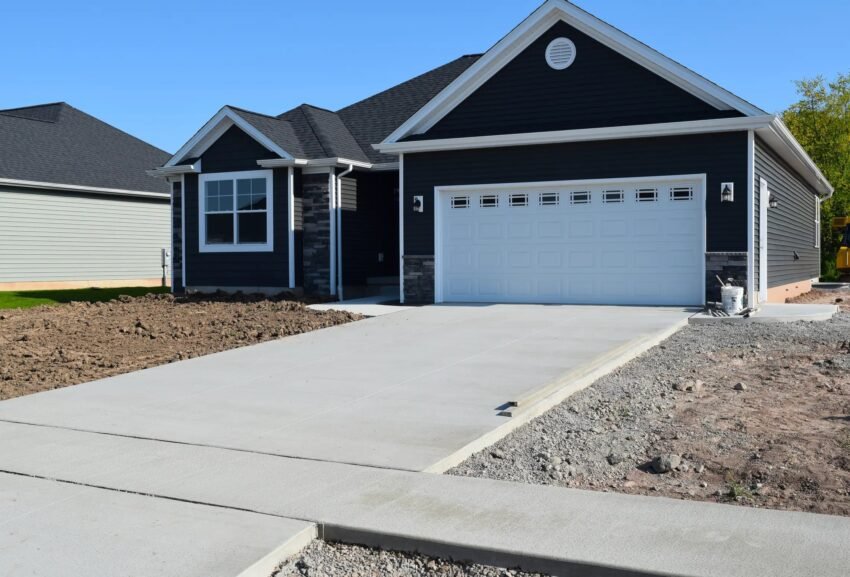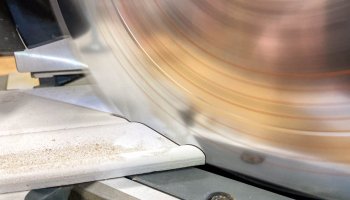
The average cost to install a concrete driveway is $4 to $18 per square foot, with most homeowners paying a total of $2,300 to $7,500. The size of your driveway, the type of finish, and additional features to enhance the appearance can all influence the total cost of this project. We’re going over everything you need to know about concrete driveway installation, including price, material comparisons, money-saving tips, and answers to FAQs.
Concrete vs. Cement vs. Asphalt Driveways – Which is Best for What?
First, it’s important to clarify the difference between concrete, cement, and asphalt, as the terms are often used interchangeably, but all three products are very different.
The Difference Between Concrete and Cement
The terms concrete and cement are often confused or used interchangeably. However, cement is actually a primary ingredient that is used in concrete, and it’s rarely used alone except to make small repairs.
Concrete, on the other hand, is made from cement, water, aggregate, and other admixtures combined together in the right proportions to create a strong and durable building material. It’s used to build everything from sidewalks and driveways to patio pavers and skyscrapers.
In fact, concrete is so widely used that it is remarkably the second-most used substance in the world, right after water.
The Difference Between Concrete and Asphalt
Both asphalt and concrete are commonly used for driveways and are long-lasting and durable products. Both of them contain aggregate and binders.
The main difference between concrete and asphalt is the type of binder. As mentioned, concrete is made with a cement binder, while asphalt is made with a petroleum-based binder.
Features and Characteristics of Concrete Driveways
Every type of driveway has advantages and drawbacks, but there are plenty of reasons that concrete is the most popular type.
Best Applications for Concrete Driveways
Concrete is one of the most versatile building materials in the world, especially when it comes to driveways. Concrete can be finished in various ways with different textures, colors, and patterns.
Whether you choose a plain concrete driveway that offers a sleek appearance or you want something fancier, like stamped and sealed concrete, you have an almost endless number of choices for design and installation.
Limitations of Concrete Driveways
Concrete has a few drawbacks, however. It’s more expensive than other types of driveways, and it can crack in cold weather. Like asphalt, it’s prone to damage from freeze and thaw cycles, and once it’s been compromised, it’s not easy to repair.
Key Qualities of Asphalt Driveways
Asphalt driveways are another popular choice, and although asphalt is less expensive than concrete, it has a shorter lifespan. Concrete driveways have a 30 to 50-year lifespan, but asphalt falls apart after about 20 to 30 years.
Optimal Uses for Asphalt Driveways
Asphalt is often used for long driveways since it’s less expensive than concrete. Repairs are easy, and it’s a low-maintenance alternative that enhances the appearance of your home.
Asphalt Driveway Cost vs. Concrete
The cost of asphalt driveways is usually lower than concrete, at about $7 to $13 per square foot. Concrete driveways cost an average of $4 to $18 per square foot.
Cons of Choosing Asphalt Driveways
Asphalt is easier to repair than concrete, but it also requires more maintenance because it falls apart more easily. However, one of the biggest drawbacks of asphalt is how sticky it gets in the summer.
Factors in Calculating Concrete Driveway Costs

Material Requirements
The average cost of concrete per cubic yard is $110 to $165. With supply shortages, some areas are seeing prices as high as $220.
For large projects like driveways, you can order it by the truckload. Most truckloads hold about 10 cubic yards, which costs between $1,100 and $1,650.
Concrete Quality and Type
There are different grades of concrete based on compressive strength tests and rated according to the pounds per square inch (psi).
For concrete driveways, the recommended psi is 3,000 to 4,500, but if you plan on using your driveway for a heavy vehicle, experts recommend a higher grade of 5,000 to 6,000 psi.
Necessary Admixtures
Concrete admixtures are used to improve the workability of concrete. Various admixtures can increase the strength or make the concrete cure faster or slower. The cost of concrete may vary depending on what types of admixtures are used.
Reinforcing Bar and Forms
Concrete driveways need reinforcing bars, also known as rebar. Some installers use a combination of rebar and wire mesh, providing increased strength and cracking resistance.
The cost of rebar adds to your total project cost. The rebar and wire mesh cost adds about $1 to $3 per square foot. Your project cost may also include the cost of materials for forms.
Labor and Installation
Concrete installations are done by skilled laborers, which is why labor usually makes up about 40% to 50% of the total cost of concrete driveways, costing about $3 to $6 per square foot. Labor for the basic pour can include unskilled laborers and costs about $1.50 to $2 per square foot.
Specialty finish laborers can finish your concrete in various ways, but the cost goes up when you choose decorative options.
Installation Time Frames
From excavation to sealing, concrete driveway installations usually take about three days. However, concrete curing takes a few weeks, and it isn’t completely cured for up to two months.
In most cases, however, your new concrete driveway can be driven on after about seven days.
Additional Costs and Considerations

Driveway Design and Features
Driveway design features, such as textures and finishes, influence concrete driveway costs. There are also colored concrete options to consider.
Textures and Finishes
In addition to the skilled labor costs, materials for the textures and finishes add to the cost of your concrete driveway. Depending on your chosen design, you may need to purchase additional materials, such as stamp mats, bricks, or river rocks.
Colored Concrete Options
There are a variety of colored concrete options that can add to the cost of your concrete driveway. Concrete can be stained and sealed in various colors to enhance your home’s appearance, but it costs more.
Depending on the use and application, concrete coloring solutions come in powdered and liquid form.
Site Preparation and Challenges
Site preparation is a necessary step before you can install a concrete driveway. Learn more about the expenses associated with excavation, ground leveling, and adding a subbase.
Excavation and Ground Leveling
Excavation and ground leveling, required for installing a concrete driveway, costs about $60 to $70 per hour. It may also entail the removal and disposal of your old concrete driveway. Some contractors include the cost of excavation and old concrete removal in the overall driveway bid.
Adding a Subbase
For best results, you should install a subbase of ¾ inch minus gravel and tamp it into place. A gravel subbase costs $1 to $3 per square foot. Adding a subbase may also require using a rented compactor or roller, which costs about $200 per day.
Concrete Driveway Costs by Driveway Length

Short Driveways
Short driveways cost from $800 to $11,200. The most common short driveway size is 20 feet by 20 feet.
Here are some average short driveway sizes and their associated costs:
| Driveway size | Square feet | Average cost |
| 10 x 20 | 200 | $800 to $3,600 |
| 12 x 24 | 288 | $1,150 to $5,000 |
| 20 x 20 | 400 | $1,600 to $7,200 |
| 24 x 24 | 576 | $2,300 to $10,400 |
| 24 x 26 | 624 | $2,500 to $11,200 |
Extensive Driveways
The longer the driveway, the more it will cost since there is an increased need for materials and labor.
Many people choose to install a concrete parking area with an asphalt driveway for extensive driveways simply because the price is much lower.
The average cost of an asphalt driveway per linear foot is $35 to $85, depending on factors like your location and the width of your driveway.
DIY Concrete Driveway Costs vs. Hiring a Professional

Building a concrete driveway is an advanced DIY project, but many experienced and skilled DIYers have tackled this challenge with good results. Learn more about the pros and cons of DIYing it versus hiring a professional.
DIY Adventures in Driveway Making
When determining the DIY cost for a concrete driveway, you must factor in all the materials, tools, and equipment.
Material Sourcing
You’ll need to source everything from excavation equipment to concrete, so you must thoroughly research everything you need. Some people hire someone just for the excavation and subbase and then pour the concrete themselves.
Learning and Implementing Techniques
There is a lot to know about pouring concrete, and if you’ve never done this type of work, it’s a good idea to start with a smaller project, such as a sidewalk or concrete pad.
If you’re interested in using stamped or imprinted and dyed concrete for your driveway, you may also want to practice implementing new techniques on a patio project in your backyard. Since your driveway is the first thing people see, mistakes on your driveway will have a greater impact on your home’s value.
Enlisting Professional Help
Since concrete work is hard work, and the potential is high for costly mistakes, many people prefer to leave this job to the pros.
Expertise and Efficiency
Professional concrete contractors have years of experience installing concrete driveways. They are quick and efficient, and you can rest assured that their work will be high quality.
Ensuring Durability and Aesthetics
Even though hiring a professional will cost much more than DIYing it, many people choose professional installation because they can count on the quality of work.
Professionals can also offer you a wide range of customization options to give your driveway a unique look that matches your home’s aesthetics.
How to Save Money on Concrete Driveway Costs

Intelligent Material Purchasing
If you’re DIYing your concrete driveway, you can shop around and find the best deals on materials.
Opting for Simple, Elegant Designs
While decorative options are appealing, you can save a lot of money by going with plain concrete. Using a simple, elegant design with a classic finish for your driveway will be much less expensive.
Get At Least Three Quotes
If you’re hiring a contractor, try to get at least three quotes to compare prices for the cost to remove and replace your concrete driveway. Remember that some contractors don’t include excavation and old concrete removal in their quotes.
Old Driveway Removal
Removing your old driveway can save a few dollars per square foot. There are many creative ways to use old concrete, such as making a fire pit or installing a retaining wall.
Frequently Asked Questions About Concrete Driveway Costs
How does the thickness of the concrete affect the overall driveway cost?
The thicker the concrete, the more your driveway will cost. The standard thickness for concrete driveways is four inches. If your driveway is used for heavy vehicles, you should use at least five inches, which will add about 15% to 20% to the cost of your project.
Can existing driveways be resurfaced rather than replaced to save costs?
Resurfacing a driveway is a cost-effective option in many cases, but it will only add about 10 years of life to your driveway. In the long run, it may be worth it to replace your driveway if it’s in really bad shape.
How long should I expect a newly installed concrete driveway to last?
Concrete driveways last 30 to 50 years, depending on factors like quality of installation, environmental conditions, and temperature extremes in your region.
Is it feasible to install a concrete driveway in phases to spread out the cost?
Unless you live in a neighborhood with strict HOA regulations, no rule says you have to replace your entire driveway at once. If you’re DIYing your concrete driveway, completing the project in smaller, more manageable sections may be easier.






